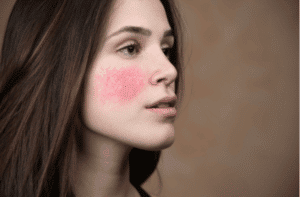
Acne
Acne is a skin condition that is caused by the overproduction of oil, called sebum, on the skin. The sebum can mix with dead skin cells and bacteria to form a plug in the hair follicle. This plug can cause a blackhead or whitehead to form. If the plug enlarges, it can break through the surface of the skin and cause an acne lesion.
Rosacea
Rosacea is a skin condition that is characterized by redness on the face. The redness can be accompanied by bumps, pimples, and spider veins. Rosacea can also cause the eyes to be bloodshot and the skin to feel dry and itchy.
What are the differences between acne and rosacea?
- The main difference between acne and rosacea is that acne is caused by sebum overproduction, while rosacea is caused by inflammation.
- Acne lesions are typically blackheads or whiteheads, while rosacea lesions are usually red bumps or pimples.
- Additionally, acne is more common in teenagers and young adults, while rosacea affects people of all ages, but is most common in those over the age of 30.
- Treatment for acne typically includes over-the-counter or prescription medications, while treatment for rosacea usually includes topical creams or antibiotics
What are the similarities between acne and rosacea?
Both acne and rosacea can cause redness on the skin. Additionally, both conditions can be accompanied by bumps or pimples. However, acne is more likely to cause blackheads or whiteheads, while rosacea is more likely to cause red bumps or pimples. Lastly, both acne and rosacea can cause the eyes to be bloodshot and the skin to feel dry and itchy.
How to seek treatment for acne or rosacea
If you are not sure which skin condition you have, it is best to see a dermatologist for diagnosis and treatment. Treatment for acne and rosacea can vary, so it is important to get the correct treatment for your specific condition. It’s no secret that there are prescription treatment methods using drugs like , which are suitable for both conditions. Our team at the Skin and Beauty Center in California can assist!
